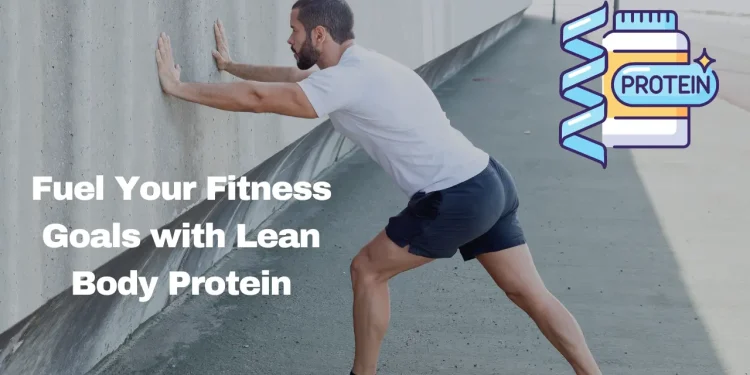There’s no denying the significance of exercise in the pursuit of health and fitness. Many individuals focus only on exercise while trying to become fit, but often neglect the importance of a healthy diet. Protein is an important part of a balanced diet for those who are into physical activity. In addition to assisting with muscle growth and repair, protein can also aid in meeting weight and body composition targets. In this article, we’ll discuss how lean body protein can support your workout routine and overall health. We’ll also go over how to pick the best protein supplement and give you some concrete advice for getting more lean body protein into your diet.
What is lean body protein?
Lean protein sources include chicken breast, turkey, fish, lean beef, egg whites, low-fat dairy products, legumes, nuts, and seeds. Fitness requires protein because it builds and maintains muscular mass.
Muscle growth requires fixing exercise-induced muscle fiber breaks.
Muscle development and repair rely on the amino acids provided by protein.
Without protein, the body can’t repair and replace muscle tissue, making muscle growth tougher.
Lean protein may also help you lose weight. Protein-rich meals make you feel fuller and burn fewer calories, according to research. Protein-rich diets may help retain muscle mass while losing weight.
Common sources
Foods rich in lean body protein may be found everywhere. Examples of popular references are:
- One of the most often consumed lean protein sources is chicken breast due to its high protein content and low fat content.
- Turkey: Like chicken breast, turkey is a lean source of protein with a low fat content.
- Salmon, tuna, and cod are just a few examples of fish that are high in both protein and omega-3 fatty acids, which are good for your heart.
- Sirloin and tenderloin, two of the leanest cuts of beef, are excellent sources of protein and iron.
- Protein-rich egg whites that are also minimal in calories and fat
- Greek yogurt, cottage cheese, and skim milk are just a few examples of low-fat dairy products that are packed with protein and calcium.
- Legumes, such as beans, lentils, and chickpeas, are a fantastic vegetarian source of lean protein due to their high protein and fiber content.
- Nuts are a fantastic choice for a snack since they include both protein and healthy fats.
How does lean body protein help fuel your fitness goals?
Protein’s essential function in muscle growth and repair
Muscle growth and repair rely heavily on protein. Muscle growth is contingent on the mending of microtears, which occur in the muscle fibers during exercise. Protein is important because it contains the amino acids the body needs to perform these tasks.
Amino acids are the building blocks of the organism and are created when protein is digested. The body uses these amino acids to create proteins for a wide range of tasks, including muscle repair and development. There are nine essential amino acids that the body can’t make on its own and must get from food.
Getting enough protein each day is crucial for proper muscle repair and growth. Consuming 0.8 grams of protein per kilogram of body weight each day is a good rule of thumb, although the exact quantity of protein required varies greatly depending on age, sex, weight, and activity level. Regular strength trainers and endurance athletes may need more protein than the average person to maintain muscle mass and speed up the recovery process.
How protein can help with weight loss and body composition goals
Protein may aid weight loss and body composition in many ways.
Secondly, protein helps individuals lose weight by filling them up.
Protein eating may help you lose weight by stimulating the brain’s fullness hormones.
Second, protein protects lean muscle mass, helping with fat reduction. With a calorie shortage, your body may tear down muscle for fuel. Protein may help preserve muscle mass during fat reduction.
Finally, protein may increase resting energy expenditure. Protein digestion and absorption utilize more energy than carbohydrates or lipids. Protein may increase the basal metabolic rate and help individuals lose weight.
Examples of how incorporating lean body protein into your diet can improve athletic performance
Lean body protein may boost athletic performance in numerous ways. Examples are:
- Muscle development and repair need protein. Lean body protein ingestion after exercise improves muscle repair and performance in subsequent activities.
- Muscles need protein too. Nutrition and strength training may boost sports performance.
- Protein boosts athletic endurance. Prolonged exercise may cause muscle breakdown exercise may cause muscle breakdown. Protein before and during exercise increases stamina and performance.
- Protein aids in both injury prevention and recovery. Bones, tendons, and ligaments are all fortified by protein, making them more resistant to damage. Protein aids in the speedy recovery of wounds.
- Finally, a functioning immune system needs protein. Athletic stress raises the risk of illness. Protein-rich diets may increase immunity and prevent illness.
Tips for incorporating lean body protein into your diet
Consuming extra lean protein is simple. Some starting points:
- As said, lean proteins have less fat and calories. Egg whites, tofu, low-fat dairy products, and chicken and fish breasts are examples.
- Eat protein at every meal. Include protein in all meals and snacks. This may help you receive enough protein to grow and repair muscles daily.
- Plan ahead: If you’re short on time or depend on convenience foods, plan protein-rich meals and snacks. Grilling a chicken breast on Monday for salads, wraps, and stir-fries all week saves time and money.
- If you’re not receiving enough protein from meals, consider whey or plant-based protein powder. Protein supplements improve smoothies, cereals, and baked goods.
- To be healthy, you need carbohydrates, good fats, and protein. For health and fitness, consume a variety of nutrients.
Choosing the right lean body protein supplement
Lean-body protein supplements come in many varieties. Consider these while choosing a protein supplement:
- Whey, casein, or plant-based proteins like pea, soy, or hemp are good protein supplements. Whey protein is advised for its quick absorption; however, vegans and dairy-sensitive people may choose plant-based protein powders.
- Make sure each meal has adequate protein for your workout.
- Protein should be 20–25 grams per dish.
- Protein supplements may include sweeteners, flavors, and thickeners.
- Choose supplements without fillers or preservatives.
- Choose a trusted brand with high-quality ingredients and positive ratings from previous buyers.
- An impartial lab can verify the supplement’s quality and purity.
- Protein supplement costs vary, so consider your budget. Subpar ingredients may make cheaper supplements less effective.
Conclusion
Supporting fitness objectives like muscle building, weight reduction, and enhanced athletic performance may be achieved with more lean body protein. Incorporating protein into your meals and snacks is simple if you choose lean protein sources and plan ahead. Use a high-quality protein supplement to obtain additional protein. The best way to achieve your fitness objectives and improve your health is to eat a protein-rich, well-balanced diet.
Read – Frizzy Hair Men | Tips and Products for a Smooth and Stylish Look













